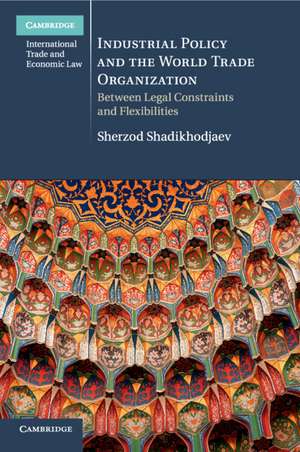Industrial Policy and the World Trade Organization: Between Legal Constraints and Flexibilities: Cambridge International Trade and Economic Law
Autor Sherzod Shadikhodjaeven Limba Engleză Paperback – 25 mar 2020
Din seria Cambridge International Trade and Economic Law
-
 Preț: 177.62 lei
Preț: 177.62 lei -
 Preț: 271.22 lei
Preț: 271.22 lei -
 Preț: 284.39 lei
Preț: 284.39 lei - 23%
 Preț: 691.86 lei
Preț: 691.86 lei -
 Preț: 177.47 lei
Preț: 177.47 lei - 14%
 Preț: 699.45 lei
Preț: 699.45 lei -
 Preț: 216.93 lei
Preț: 216.93 lei - 14%
 Preț: 698.61 lei
Preț: 698.61 lei -
 Preț: 321.52 lei
Preț: 321.52 lei -
 Preț: 272.97 lei
Preț: 272.97 lei -
 Preț: 323.05 lei
Preț: 323.05 lei - 14%
 Preț: 868.71 lei
Preț: 868.71 lei -
 Preț: 292.88 lei
Preț: 292.88 lei - 23%
 Preț: 642.03 lei
Preț: 642.03 lei -
 Preț: 178.30 lei
Preț: 178.30 lei -
 Preț: 432.05 lei
Preț: 432.05 lei -
 Preț: 320.17 lei
Preț: 320.17 lei - 23%
 Preț: 753.36 lei
Preț: 753.36 lei - 11%
 Preț: 636.34 lei
Preț: 636.34 lei - 23%
 Preț: 615.99 lei
Preț: 615.99 lei - 14%
 Preț: 703.74 lei
Preț: 703.74 lei -
 Preț: 285.37 lei
Preț: 285.37 lei - 14%
 Preț: 699.45 lei
Preț: 699.45 lei - 14%
 Preț: 786.62 lei
Preț: 786.62 lei -
 Preț: 314.82 lei
Preț: 314.82 lei - 14%
 Preț: 895.68 lei
Preț: 895.68 lei - 14%
 Preț: 708.14 lei
Preț: 708.14 lei - 14%
 Preț: 1015.31 lei
Preț: 1015.31 lei - 14%
 Preț: 896.85 lei
Preț: 896.85 lei -
 Preț: 405.20 lei
Preț: 405.20 lei -
 Preț: 322.51 lei
Preț: 322.51 lei - 14%
 Preț: 727.26 lei
Preț: 727.26 lei -
 Preț: 283.79 lei
Preț: 283.79 lei - 14%
 Preț: 727.59 lei
Preț: 727.59 lei - 14%
 Preț: 785.48 lei
Preț: 785.48 lei
Preț: 288.42 lei
Nou
Puncte Express: 433
Preț estimativ în valută:
55.19€ • 57.77$ • 45.93£
55.19€ • 57.77$ • 45.93£
Carte tipărită la comandă
Livrare economică 31 martie-14 aprilie
Preluare comenzi: 021 569.72.76
Specificații
ISBN-13: 9781316508459
ISBN-10: 1316508455
Pagini: 347
Dimensiuni: 152 x 230 x 18 mm
Greutate: 0.47 kg
Editura: Cambridge University Press
Colecția Cambridge University Press
Seria Cambridge International Trade and Economic Law
Locul publicării:Cambridge, United Kingdom
ISBN-10: 1316508455
Pagini: 347
Dimensiuni: 152 x 230 x 18 mm
Greutate: 0.47 kg
Editura: Cambridge University Press
Colecția Cambridge University Press
Seria Cambridge International Trade and Economic Law
Locul publicării:Cambridge, United Kingdom
Cuprins
Part I. General Tools of Industrial Policy: 1. Industrial policy under the global trade regime; 1.1. The conceptual framework for industrial policy; 1.2. The multilateral trading system and industrial policy; 1.3. Concluding remarks; 2. Protection of domestic industry; 2.1. Border restrictions; 2.2. Taxes; 2.3. Product standards; 2.4. Protection of services industries; 2.5. Concluding remarks; 3. Promotion of domestic industry; 3.1. The economics of government subsidies; 3.2. The WTO subsidy regime; 3.3. Industrial policies in upstream sectors; 3.4. Concluding remarks; Part II. Special Topics of Industrial Policy: 4. Free zones and industrial development; 4.1. Free zones as an industrial policy tool; 4.2. Free zones under the revised Kyoto Convention; 4.3. Free zones under WTO rules; 4.4. Customs and trade rules: some questions of concurrent application; 4.5. Concluding remarks; 5. Local content requirements and industrialization; 5.1. LCRs and world practice; 5.2. Review of the economic literature; 5.3. The scope of the WTO-applicability to LCRs; 5.4. Legality of LCRs under WTO rules; 5.5. Data localization requirements as an emerging issue; 5.6. Concluding remarks; 6. The greening of industrial policy; 6.1. Environmental dimensions of industrial policy and trade; 6.2. Border carbon adjustments; 6.3. Renewable energy subsidies; 6.4. Environmental labels; 6.5. Environmental exceptions under GATT Article XX; 6.6. Harmonization of the trade and environmental regimes; 6.7. Concluding remarks; 7. Industrial policy in the age of creative economy; 7.1. Creative economy as a new paradigm of industrial policy; 7.2. The status of creative products under the WTO legal framework; 7.3. Creative economy and technological progress under WTO law; 7.4. Policy space for trade restrictions on creative products; 7.5. Concluding remarks.
Recenzii
'Professor Shadikhodjaev has written a must-have reference book for anyone who cares about the role of governments in the global economy and world trading system.' Julia Ya Qin, Wayne State University and Peking University International Law Institute
'This informative book describes what forms of industrial policy are consistent with the rules of the World Trade Organization. The book is densely written and thick with legal terminology, but it is valuable as an authoritative reference work. In addition to analyzing WTO policies, Shadikhodjaev provides a useful catalog of areas where the WTO's rules are ambiguous and suggests how they might be clarified and improved.' Richard N. Cooper, Foreign Affairs
'This informative book describes what forms of industrial policy are consistent with the rules of the World Trade Organization. The book is densely written and thick with legal terminology, but it is valuable as an authoritative reference work. In addition to analyzing WTO policies, Shadikhodjaev provides a useful catalog of areas where the WTO's rules are ambiguous and suggests how they might be clarified and improved.' Richard N. Cooper, Foreign Affairs
Notă biografică
Descriere
Highlights what national governments should know to properly conduct their industrial policies under the multilateral trading system.
